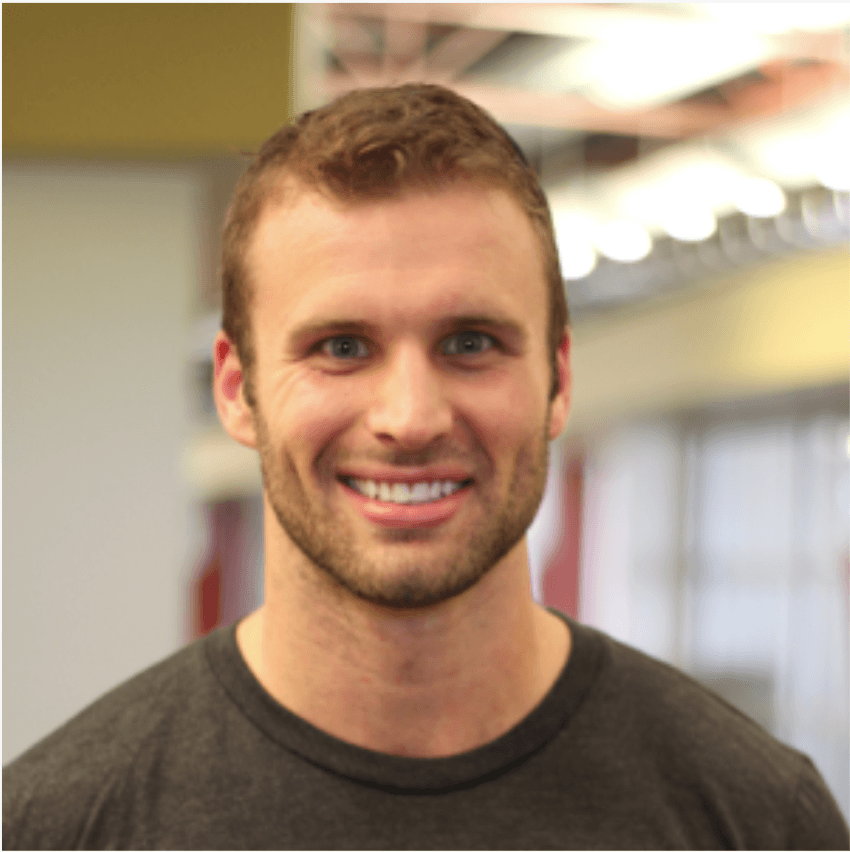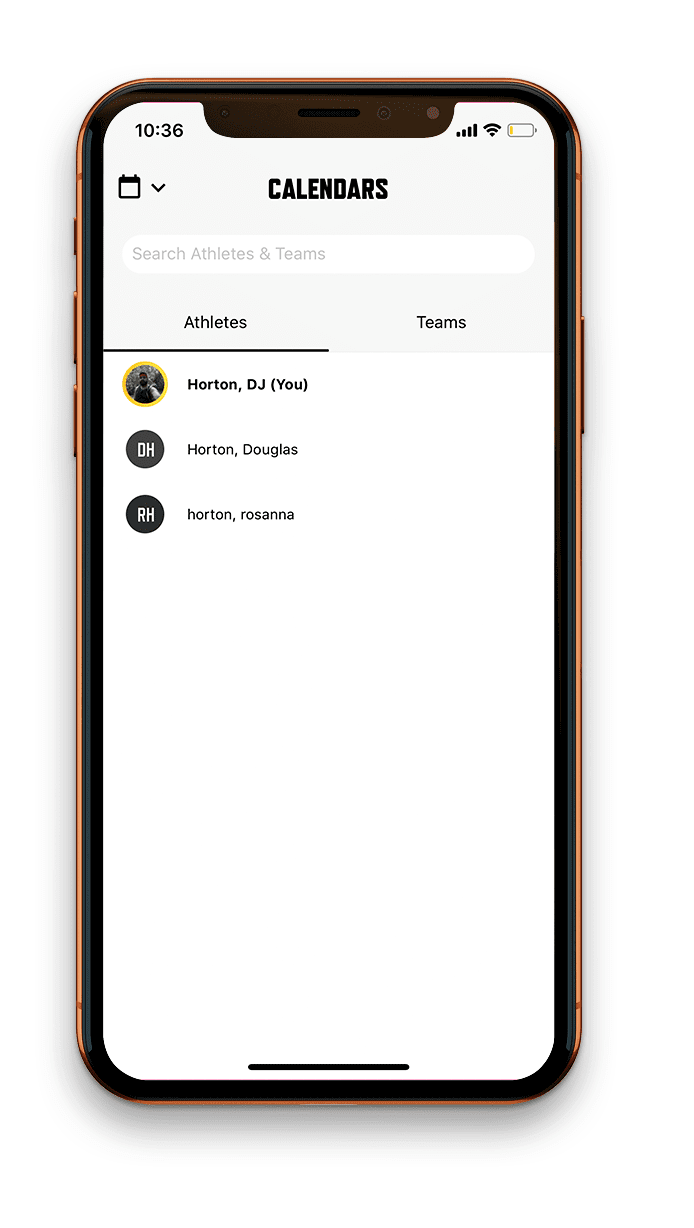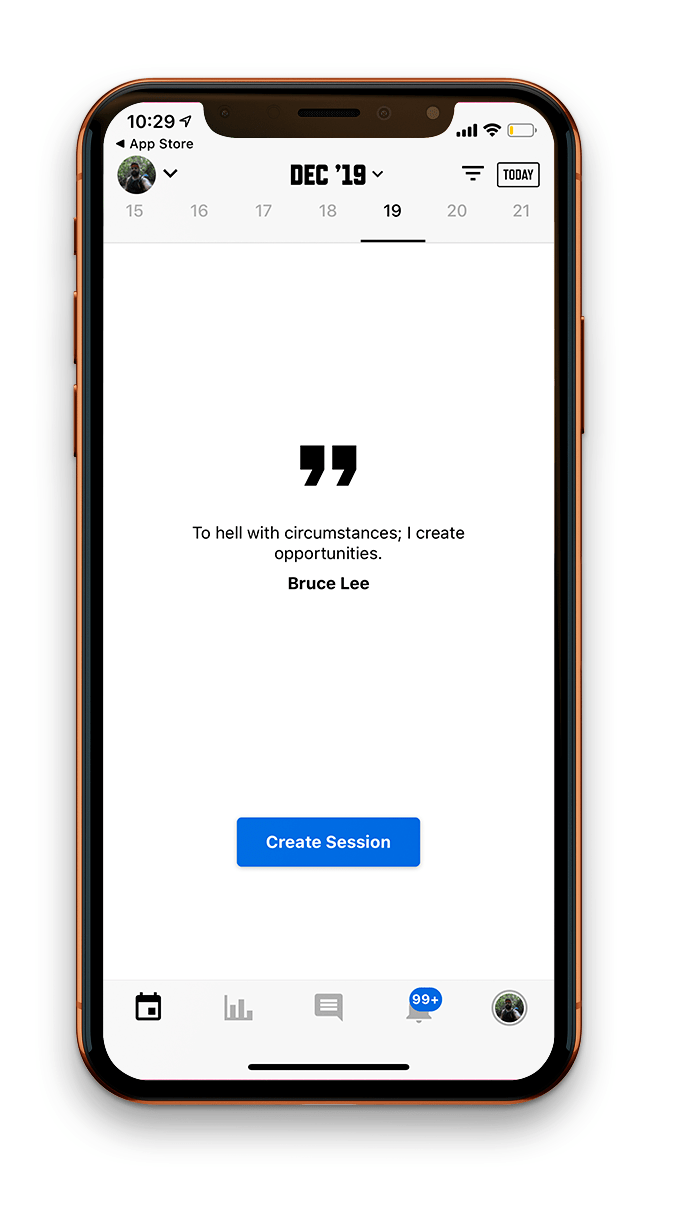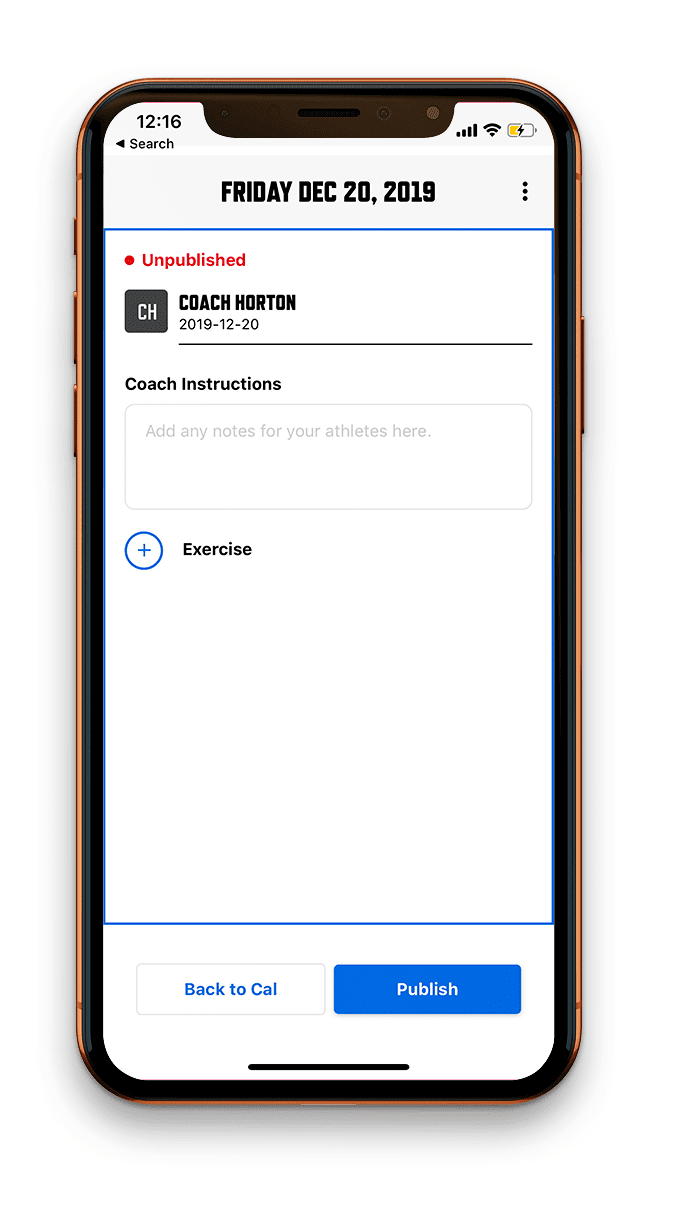Mobile Programming: Change, adapt, evolve
Product UpdatesAbout the Author

BEN CROOKSTON
Ben Crookston is the Founder and CEO of TrainHeroic. Prior to finding his home in the tech world, Ben ordered the Sampler off the career menu, teaching, coaching, and writing. He has an incredible family and back squats 500 pounds A2G.
// strength & conditioning programming directly from your phone
While last month we put out an array of features for athletes to edit their prescribed training on their mobile devices, Coaches can now do so much more for their athletes from their phones. Now, TrainHeroic coaches can:
- View and manage Athlete and Team Calendars
- Create new sessions when your athletes drop in for training
- Edit sessions on the fly
- Reschedule sessions when life’s roadblocks occur
- Delete sessions when athletes need a break
- Copy and paste sessions on the calendar to iterate on existing programming
All from the convenience of their mobile device.



// navigation on our athlete’s training journey
All of our athletes are on their own journey.
As coaches, it’s a fact that’s too easy to forget. Like anyone else, it’s easy to allow ourselves to feel self-important. It’s easy to let ourselves believe it’s about us.
In reality, we have a pretty basic role:
Within our athlete’s journey, we are the mentor.
We are responsible for providing four basic things:
- High standards (“This is how it’s done”)
- Assurance (“I know you can do it”)
- Direction (“Here is the path”)
- Support (I’m here for you)
In this manner, we are little more than a trusty guide in their journey; a steady, reliable co-pilot in the car as they drive toward their desired destination.
Our athletes are ultimately the ones in control. Their hands are on the wheel and their foot is on the gas. We’re there to provide the map, narrate the course, monitor the dash, and help them adjust course when things get in their way.
being the best co-pilot
This past weekend, I had the privilege of hearing Dr. Chris Morris, Director of Sports Science at the University of Kentucky, drop knowledge at the Power Athlete Symposium.
If you haven’t been, the Symposium is an unbelievable experience for the mind, body, and soul. For any committed coach or athlete, it’s well worth an annual voyage. If meeting and learning from thinkers like Chris isn’t enough, the opportunity to indulge at Austin Food trucks, connect with your comrades in the war on mediocrity, and watch Tex get tazed is an outsized return on investment.

Fluid Periodization – programming on the fly
In his presentation, Dr. Morris introduced a training model he calls “Fluid Periodization.”
To illustrate his approach, he asked us to consider the navigation app Waze.
Waze is a navigation app that dynamically adjust the route to your destination by acknowledging roadblocks, traffic, and accidents, so that the journey to your destination is the smartest path you can take, in real-time.
Dr. Morris suggested that the training model we leverage with our athletes should be a lot like Waze in this way. When providing direction to our athletes in the form of a program, too often we view it as a static map. However, if we want to optimize our impact and improve our results, Dr. Morris suggested the map we should provide is one that responds in real-time.
Within Fluid Periodization, Chris suggests we accept the external factors of reality. We humbly acknowledge the roadblocks (logistical complications), impact of traffic (too much stress), and random accidents (injury) that invariably come our athlete’s way.
This isn’t to say we change our desired destination, it just means we may not take the path we originally planned to get there. We openly admit that our map was just a best guess in the first place. Accordingly, we update our hypothesis with the latest information so it’s tuned to provide the fastest path toward optimal performance.
Less Rand McNally…more Waze. Cartography for the modern era.
I think Fluid Periodization is genius on several levels:
- Branding
- Theory
- Application
- Universality
Branding
I’m a sucker for good branding and not ashamed to admit it.
While we’ve all been told not to judge a book by its cover, any joe who’s bought an RxBar, Strong Coffee, or Apple product can attest to the power of purty packaging.
Chris’ naming convention is self-evident, effortless to remember, and easy to communicate. These qualities lend it to rapid uptake and sharing. While I’m not sure Chris’ ever studied Ogilvy, he certainly applied the tenets of good branding when naming his model.
Theory
Fluid Periodization just makes sense. It works on both an intuitive and logical level.
When do we ever experience life going exactly as planned? If ours doesn’t, why would we expect it to be the case for our athletes?
To account for such variability, the Fluid model assumes programs are a work in progress, not pillars of perfection.
This is a good thing because Fluid systems are inherently more resilient than rigid systems. Bruce Lee is famed for instructing his followers to “be like water.” He taught that water’s qualities provide it the ultimate strength.
Water can break through any substance, cannot be hurt, is infinitely flexible, and always adapts to the context in which it’s placed. Fluid periodization channels Bruce’s wisdom. It takes programs off the pedestal and puts them into practice.
Application
While it may seem like more work, in the end, there’s a case that a Fluid model saves time.
I’ve seen enough evidence to believe a Fluid approach creates less overall work by reducing waste. In fact, we’re seeing many of our best coaches have great success applying such a method.
For example, Drew Hammond, Director of Human Performance with Air Force Special Operations plans a week at a time. While he used to program in 4-6 weeks blocks, he continued to find his athletes getting banged up, injured, or deployed into the field of battle. He found himself constantly throwing out weeks of programming and starting anew.
To save his sanity and enhance his athletes’ experience, Drew now only works in microcycles.
If a week works, he progresses it the following week; copying, pasting, and making adjustments on the fly based on the data he gets back from his athletes.
If the wheels start to fall off, he can easily swap in a new template and make a quick tweak. Without a long-term investment, his emotional and practical attachment to the plan is nil. By reducing the emotional and logistical sunk cost, Drew makes it easier to do what’s best for his athletes.
Using this model, he’s singularly able to provide a personalized level of service to over two hundred operators.
Universality
I tend to like things that have broad appeal and I believe this model works in any planning context.
In fact, at TrainHeroic, this “Fluid Periodization” model, mimics the “just in time” / “Lean Roadmapping” model we use in product development. After years of planning annual…and sometimes multi-year roadmaps, we gave up. We continued to experience the plans we created were outdated, often by the time we put them into practice.
While we held a strong understanding of where we are today and vision of where we wanted to go, what kept getting mucky was everything in-between.
Today, we plan just enough to get data on what’s working best for our customers. We see how they respond, then we adjust our course accordingly. We’ve found such flexibility helps us to better serve our coaches around the world while keeping our team happy and on the same page.
// bringing it home: giving you the power to change, adapt, evolve
As you may be able to tell, at TrainHeroic, we’re big believers in Fluid Periodization, by any name. And to align ourselves to that belief and make its implementation as easy as possible, today we rolled out a new solution so coaches can better adjust their athletes’ training on the fly.
Our vision has always been to put more power in coaches’ hands. This latest solution is just the next logical step toward that end.
TrainHeroic exists to empower you to coach more athletes, better. We hope these solutions make that mission, just a bit easier.
We love hearing from our customers. So if you have feedback, ideas, or just want to chat, feel free to drop us a line.
Be your best,
Ben Crookston
Founder, TrainHeroic
Are you a better coach after reading this?
More coaches and athletes than ever are reading the TrainHeroic blog, and it’s our mission to support them with useful training & coaching content. If you found this article useful, please take a moment to share it on social media, engage with the author, and link to this article on your own blog or any forums you post on.
Be Your Best,
TrainHeroic Content Team
HEROIC SOCIAL
HEROIC SOCIAL
TRAINING LAB
Access the latest articles, reviews, and case studies from the top strength and conditioning minds in the TH Training Lab

